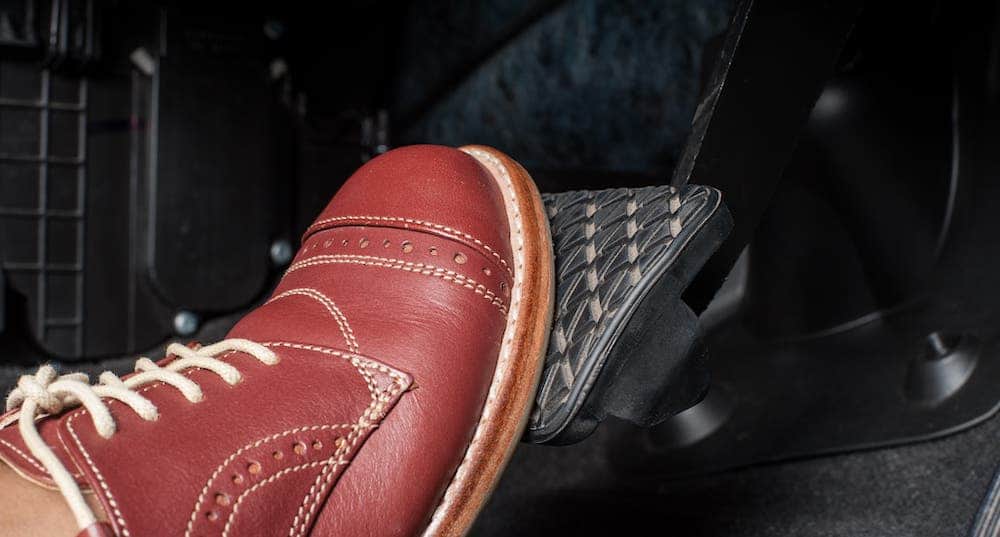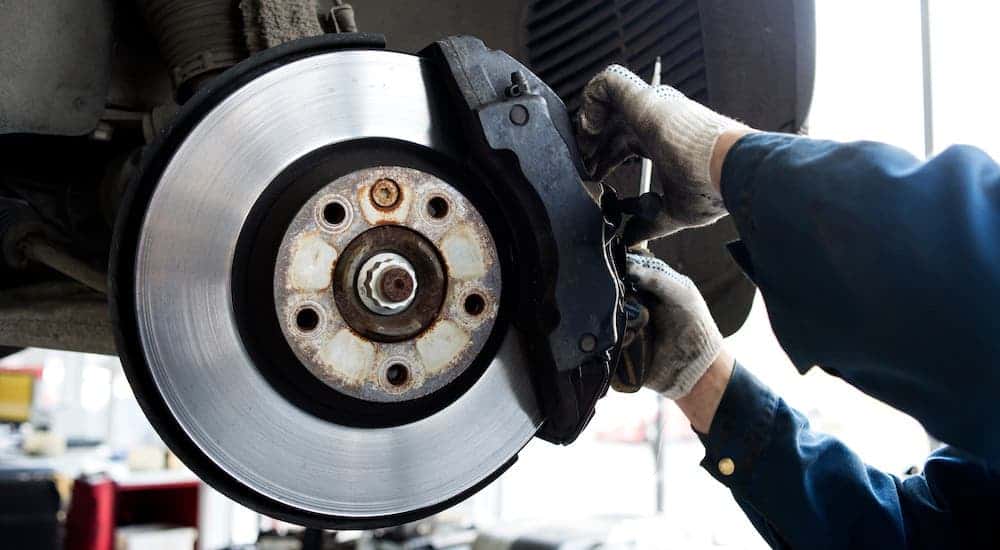Although it’s easy to get focused on exciting parts of your vehicle, like a powerful engine, innovative shocks, and special transmission, the absolute most important part of your car is the brakes. No amount of power to your wheels or microsecond-shifting of gears matters if your brakes don’t work properly to stop your car when you need to. And yet, all-too-often, we have people come to us at Kings Ford service in need of an oil change or a new battery, and they can’t remember the last time they had their brakes checked out.
Your brakes are one of those things that you can easily overlook because you simply rely on them to be there when you need them. But when they fail, it’s very easy to find yourself in a catastrophic, even deadly, situation beyond your control. So today, we’re going to go over some simple but important information about your brakes and service that you should keep in mind. While we can’t touch on everything we do here at Kings Ford service, this will give you a good sense of how to better care for your car.
What Is Brake Service?
Brake service can refer to a few different types of maintenance, but it usually indicates an inspection and any necessary repairs or replacements to keep your brakes in great shape. Sometimes it can be as simple as a quick inspection to make sure your brakes still look good and that the pads and other components are not worn or damaged. This is relatively simple for a professional service center to handle but can be difficult to do at home because your vehicle needs to be lifted up in order to see the brakes behind your wheels.
More extensive brake service may be necessary if an inspection reveals that there is an issue with your brakes – usually that the pads are worn down. Like any mechanical object, various components of your brakes can degrade or fail over time. However, even without that kind of unanticipated damage, some parts of your brakes are designed to wear down through use. That’s why it’s important to regularly visit Kings Ford service to ensure that your brakes are still in good shape.
How Do My Brakes Work?
We’re not going to get too technical about how your brakes work, but essentially they function through a hydraulic system that applies pressure when you press down on the brake pedal. This pressure is routed through different lines to your individual brakes through a system that greatly increases the amount of force – so you push gently on the brake pedal, but much more force is applied to the brakes themselves. The brakes do not physically apply this pressure to the wheels of your vehicle, as that would wear down and potentially damage the wheels.
Instead, there’s a disc or drum that is connected to your drive system and spins right along with your wheels while you drive. When you apply the brakes, a pad squeezes the disc or a shoe pushes against the inside of the drum (this depends on which kind of brakes you have, but they function relatively similarly) in order to slow it down, which in turn slows the wheels and brings you to a stop. There is a tremendous amount of heat created when you apply the brakes, so the shoes or pads in your brakes take a lot of abuse every single day and will naturally wear down over time.
How Often Do I Need Brake Service?
It would be nice if we could simply tell you to have your brakes checked and serviced at a particular interval. Unfortunately, it simply doesn’t work that way; there are a lot of different factors that can impact the condition of your brakes, and miles driven is not the only factor. For example, someone driving across the country on major highways and a relatively open road could go for hundreds of miles and use their brakes less than someone driving just a few miles on a congested freeway during rush hour.
That’s the major factor: not miles driven, but how much you actually use and apply the brakes. That’s why we can’t simply say you should have your brakes checked out every so many miles because it depends on the conditions you drive in. The type of brakes you have, how much you have to use them, and the speeds you drive when you need to apply your brakes also all play a role in brake life. So, where does that leave you?
Ultimately, it’s best to have your brakes checked whenever you have your vehicle on a lift for something else, even if they don’t need service. If you’re getting an oil change, rotating your tires, having a lube job done, or any other work, it’s a good idea to have your brakes inspected. Your brakes might be fine, or your service person might tell you they need to replace the pads, shoes, or entire assembly. But you’re better off having them check more frequently than you might really need, rather than find out the hard way that your brakes are failing.
How Do I Know if My Brakes Need Service?
While there can be some disastrous indicators that your brakes are shot (such as not being able to slow down or stop), there are a number of less catastrophic warning signs. It’s more likely that you’ll gradually notice one of these warning signs rather than suddenly not be able to stop at all. So always have a sense of how your car is handling and pay attention to anything that feels off.
Some common signs that you need brake service include:
- Brake light comes on – Many modern vehicles are designed to detect when brake pads or shoes are wearing down and alert you with a warning light on your dashboard. This might seem pretty obvious, but you’d be surprised at how often people ignore these lights.
- Squishiness in the brakes – If your brakes feel soft or squishy when you push down on them, then this can indicate the hydraulic pressure in your brake lines is low.
- Persistent squeaking or squealing – Some squeaking of your brakes, particularly when they’re wet, is fairly common and not necessarily a problem. If you notice that they continue to squeak or squeal regularly, however, then you probably need service.
- Grinding metal sound – Any grinding metal sound from your vehicle is a bad thing, and it often means your brakes are wearing down. Sometimes it is a warning, rather than the brakes actually being damaged, but don’t ignore it.
- Longer stopping distance – If you notice it takes longer than usual to stop, then that often means your brakes are wearing out or your hydraulic pressure is low.
- Vibration when braking – Feeling vibrations in your vehicle or in the brake pedal when you slow or stop typically means something is off with your brakes and that it’s time for service.
If you notice any of these signs, don’t wait to have your vehicle and brakes checked out. You’re going to be a lot happier paying for new pads or a new brake assembly than you will be dealing with the expense of a serious collision. Call or come visit us at Kings Ford Quick Lane today for brake inspection and service, an oil change, or anything else you need to keep your vehicle running beautifully.



